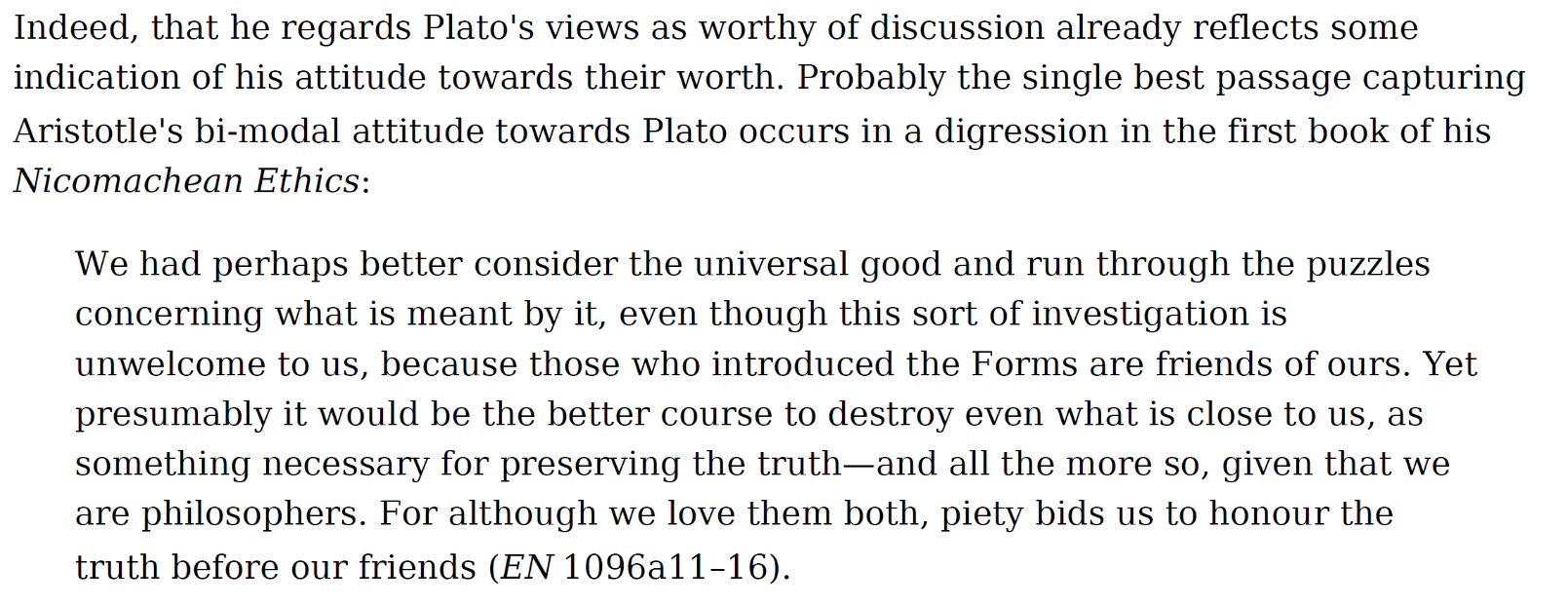prior
1. before
antiquity
1. the past, esp. before the Middle Ages (= before the sixth century), or something of great age:
2. an object that was created a very long time ago:
When was he born?
384 BC
4th century BC
What did Aristotle's works include? Which fields?
The works we possess today range
widely across an astonishing number of fields, including aesthetic theory, argumentation
theory, astronomy, botany, biology, category theory, cosmology, epistemology, ethics,
government, history of thought, literary theory, logic, mathematics, metaphysics, music,
medicine, meteorology, pedagogy, philosophy of science, political theory, psychology,
physics, rhetoric, semantic theory, political history, theology, and zoology.
How did Cicero regard Aristotle's works?
He called them ‘flowing rivers of gold.’ Aristotle's works deeply influenced Cicero.
contend
1. to compete in order to win something
2. to say that something is true or is a fact:
nuance
1. a very slight difference in appearance, meaning, sound, etc.
2. a quality of something that is not easy to notice but may be important:
Where was he born?
Stagira, in Macedon
now northeastern Greece.
Aristotle distinguishes three broad categories of inquiry. Which are.....?
The first class is theoretical, comprising disciplines pursuing knowledge for its own sake; the second is practical, including ethics, politics, and all study concerned with conduct and goodness in action, whether individual or societal; and the third is productive, covering those sciences and crafts which aim at the creation of beautiful or useful objects, broadly conceived so as to include drama and dance.
How did Aristotle regard Plato? What was their philosophical relationship like?
Sometimes Aristotle describes himself as a member of Plato's circle, even when criticizing Plato's views; other times, in equally critical veins, he disassociates himself from Plato and his teachings, (p. 6) writing as if from an opposing camp.
affairs
1. a situation or subject that is being dealt with or considered
2. a sexual relationship, especially a secret one
3. an event: "The party turned out to be a quiet affair. "
spurious
False
His father was
a physician in the court of King Amyntas II
How did Aristotle see his own work Organon?
It's the tools for study, not the objects of study: logic, dialectic, argument theory, philosophy of science, and the doctrines of propositions and terms.
How would you summarize this part:

We agree to disagree---for the sake of discovering the truth.
paucity
the fact that there is too little of something
匮乏
conjectures
1. a guess about something based on how it seems and not on proof:
What's the name of his school?
the Lyceum
What were some controversies surrounding Aristotle's works?
1. how they were transmitted, copied or orally passed down
2. how they were ordered and arranged
3. how many works they were
According to the Church Fathers, how did Aristotle die?
He died of curiosity.
metaphysics
1. the part of philosophy that is about understanding existence and knowledge 形而上学
2. Meta=above, after, in the midst of, Physics=matters, beings, existences
recapitulation
1. in classical music, an act of repeating an earlier theme (= tune), especially at the end of a movement (= main part):
What happened to Aristotle when he turned 17-18?
He was sent to Plato's Academy in Athens
How many surviving works do most scholars accept today?
31
True or false:
We possess no manuscript of Aristotle's works written by him or even in his own time.
True